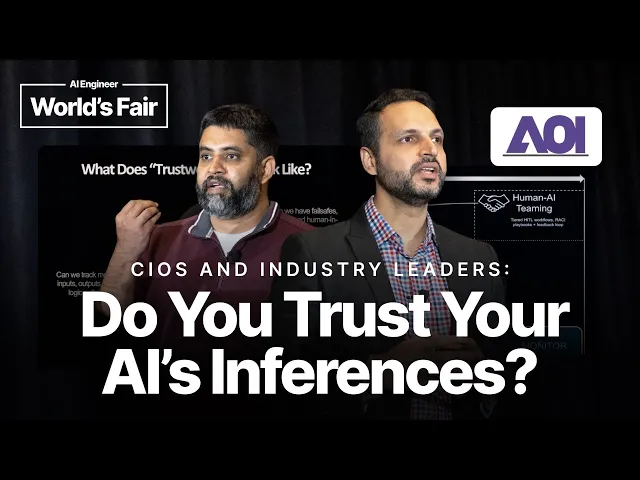Do You Trust Your AI’s Inferences? — Sahil Yadav, Hariharan Ganesan, Telemetrak

Explainable AI: trust or verify?
In a data-driven world where AI increasingly makes critical decisions, the question of trust has become paramount. At a recent tech conference, Sahil Yadav and Hariharan Ganesan from Telemetrak presented a compelling case for explainable AI—technology that doesn't just deliver results but also provides clear reasoning for its conclusions. Their presentation addresses a fundamental challenge in AI adoption: can business leaders trust the black-box recommendations that algorithmic systems produce?
Key Points
-
The trust gap in AI adoption remains significant—executives and decision-makers struggle to implement AI solutions when they can't verify or understand the underlying reasoning.
-
Explainable AI (XAI) creates transparency by providing clear rationales for predictions and recommendations, making complex models accessible to non-technical stakeholders.
-
Human-AI collaboration works best when systems are designed to augment human decision-making rather than replace it entirely—explanations facilitate this partnership.
-
Implementation barriers for explainable AI include technical complexity, model performance trade-offs, and organizational resistance to transparency.
The Transparency Imperative
The most profound insight from the presentation is that transparency isn't just a technical nicety—it's a business necessity. When stakeholders understand why an AI system recommended a particular action, adoption rates skyrocket. This matters tremendously in the current business climate where AI investments are under increasing scrutiny. According to Gartner, nearly 85% of AI projects ultimately fail to deliver value, with "lack of trust" cited as a primary factor.
The speakers' emphasis on "showing your work" resonates deeply with the emerging regulatory landscape. As the EU's AI Act and similar regulations take shape globally, explainability is transitioning from a competitive advantage to a compliance requirement. Companies that build transparency into their AI systems now won't just win more customer trust—they'll avoid potential regulatory penalties down the road.
Beyond the Presentation: Real-World Applications
What the presentation didn't fully explore is how different industries are implementing explainable AI with varying levels of success. In healthcare, for example, Beth Israel Deaconess Medical Center in Boston has pioneered an explainable AI system for diagnosing pneumonia. Their approach involves highlighting the specific image
Recent Videos
How To Earn MONEY With Images (No Bullsh*t)
Smart earnings from your image collection In today's digital economy, passive income streams have become increasingly accessible to creators with various skill sets. A recent YouTube video cuts through the hype to explore legitimate ways photographers, designers, and even casual smartphone users can monetize their image collections. The strategies outlined don't rely on unrealistic promises or complicated schemes—instead, they focus on established marketplaces with proven revenue potential for image creators. Key Points Stock photography platforms like Shutterstock, Adobe Stock, and Getty Images remain viable income sources when you understand their specific requirements and optimize your submissions accordingly. Specialized marketplaces focusing...
Oct 3, 2025New SHAPE SHIFTING AI Robot Is Freaking People Out
Liquid robots will change everything In the quiet labs of Carnegie Mellon University, scientists have created something that feels plucked from science fiction—a magnetic slime robot that can transform between liquid and solid states, slipping through tight spaces before reassembling on the other side. This technology, showcased in a recent YouTube video, represents a significant leap beyond traditional robotics into a realm where machines mimic not just animal movements, but their fundamental physical properties. While the internet might be buzzing with dystopian concerns about "shape-shifting terminators," the reality offers far more promising applications that could revolutionize medicine, rescue operations, and...
Oct 3, 2025How To Do Homeless AI Tiktok Trend (Tiktok Homeless AI Tutorial)
AI homeless trend raises ethical concerns In an era where social media trends evolve faster than we can comprehend them, TikTok's "homeless AI" trend has sparked both creative engagement and serious ethical questions. The trend, which involves using AI to transform ordinary photos into images depicting homelessness, has rapidly gained traction across the platform, with creators eagerly jumping on board to showcase their digital transformations. While the technical process is relatively straightforward, the implications of digitally "becoming homeless" for entertainment deserve careful consideration. The video tutorial provides a step-by-step guide on creating these AI-generated images, explaining how users can transform...
